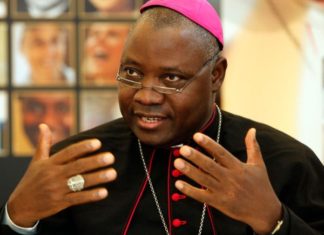I am not sure if what we are seeing in the institution of the Nigerian Senate today, falls into the American system we had copied; or intended to copy.
The United States Senate, which ours is modelled after in some degrees, according to Wikipedia, was designed as a more deliberative body than the House of Representatives.
On account of the enormity of their workload, members of the senate, are expected to be sober and circumspect in managing the affairs of the institution and the nation.
It was in that respect that James Madison, the fourth President of America, argued that “The use of the Senate is to consist in proceeding with more coolness, with more system, and with more wisdom, than the popular branch.”
This huge demand, informs the relative smaller number of senators in comparison with members of the House of Representatives. To further underscore the importance of the body, states that constitute America, share equal number in representation – two members each in the senate. And the senators clutch their title for life.
The framers of the Nigerian presidential constitution, perhaps, had these roles and accompanying prestige in mind for the senate and senators in according the institution robust mention. But whether Nigerians and successive senators are aware of these demands and privileges, is yet to be determined.
Perhaps, on account of prevailing low level of political education and awkward mercantilist mindset in the country, the senate has not been accorded its rightful place in public profile. The senators, past and present, have also not been helping matters.
Consequently, the ordinarily, hallowed chamber of the senate, has been lumped into what is euphemistically referred to as “job for the boys’.
In the process, men and women of overtly low intellectual endowment and abysmal character traits, have found themselves in the country’s upper law making house.
Of course, there have been occasional instances of some senators exhibiting character and class in their deliberations and carriage within and outside the floor. The fact however remains that since the second republic when the country opted for the American presidential model of democracy, the quality and substance of its successive senators, have been on progressive decline.
With poor perception profile on the proficiency of the institution in attending to its constitutional responsibilities, the public reckoning of the senators, has been unexciting, all the while.
But at no time in the country’s history had the senate and senators been subjected to open disdain, as in the current dispensation.
This may have to do with the skewed political transition programme that gave birth to the Peoples Democratic Party (PDP)-led Olusegun Obasanjo presidency in 1999.
Brimming with the so-called military background and his personal tendency at domination and manipulation, Obasanjo had seen in the legislature a likely stumbling block to his dictatorial designs.
The institution, thus had to compromised, diminished and disgraced. For the greater part of his eight-year presidency, undoing the legislature was a project he relentlessly pursued, not minding the cost of the bullish engagement to the development of democracy in the land.
Obasanjo had his match in the House of Representatives, where the relatively younger legislators fought him to a standstill. It was, however, not so in the Senate, where he considerably had his way, in many instances, enthroning and dethroning the leadership.
That violation of the independence of that important arm of the government, has somehow, acquired the notoriety of a trend.
This explains why, President Muhammadu Buhari, coming from the same military constituency with Obasanjo and imbued with similar culture of intolerance to opposition, no matter how well intended, does not understand why the Senate should have its voice and control of its affairs.
It then becomes easy to appreciate why the President and key officials of his executive arm, regularly treat resolutions and other actions from the legislature with scant regards.
Curiously, this incidence of odium and disdain to the senate in particular, has trickled down to Nigerians. It is thus becoming a norm, these days for even undiscerning minds at ridiculous joints to dismiss the senate and senators with mere wave of the hand. Incidentally, image makers of the government, derive fun from the sordid joke.
But that is not what the situation should be in a system with functional civic education. The senators, undoubtedly, may have not lived up to expectation in some of their actions and inactions. The allegation about some of them having questionable backgrounds may hold water when subjected to critical scrutiny. Or may not!
The fact however remains that they were elected by Nigerians and should be treated so. The beauty of democracy is the opportunity it offers in periodic elections. There is therefore chance to show the way to those not delivering on target.
But to resort to disrespecting the senators or encouraging rented commentators to write them off, amounts to huge disservice to the Nigerian electorate.
We cannot continue with these antics and expect to be respected by others nations.
Besides, lending a hand to the executive to demonise or torpedo the legislature, is the surest way of instituting dictatorship in the system. And by the time the monster blossoms, everybody will be victim, one way or another.
- Advertisement -
- Advertisement -












